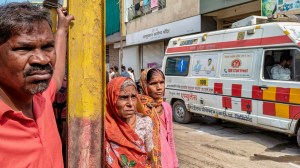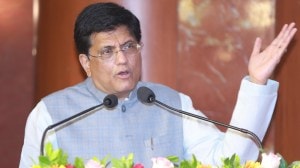Our own 145;Comrade Nyet146;
Even though London and Washington are holding their breath on the need for India and Pakistan to return to dialogue, both widely continue to...

Even though London and Washington are holding their breath on the need for India and Pakistan to return to dialogue, both widely continue to believe that there is no alternative but for the sub-continent8217;s hyphenated twins to talk to each other.
In conversations with officials in the Foreign and Commonwealth Office in London recently, the same story repeated itself: For stability in the short-term, an end to terrorism to be followed by dialogue was necessary, for stability in the long-term, the resolution of the Kashmir dispute was essential.
Turns out that both London and Washington have been keenly supporting initiatives to hold Track Two dialogues between India and Pakistan, but MEA8217;s determined ban on the participation of officials, unless Pakistan-sponsored terrorism comes to an end, has thrown cold water on these good intentions.
Many a pleasant, all-expenses-paid trip to sample the cod in Geneva or shop till you drop in Muscat8217;s mad and wonderful souk have been unceremoniously turned down by Foreign Secretary Kanwal Sibal. He reminds one of the former Soviet Union8217;s Andrei Gromyko who earned himself the epithet of 8216;8216;Comrade Nyet8217;8217; because he vetoed every US initiative at the UN in the good old days of the Cold War.
Not that London8217;s giving up. The FCO then persuaded the University of Birmingham to hold a couple of seminars on the need and scope for Confidence-Building Measures read, the nuclear question in South Asia. Aware of New Delhi8217;s anathema for Islamabad, the Centre for Defence and Security Studies at the European Research Centre in Birmingham University thought it would do one better.
It suggested that a separate conference with Pakistan be held from April 7-9 this week and one with India from April 13-16 next week, so that officials from both countries needn8217;t meet face to face. Pakistan promptly agreed, while New Delhi refused. To be sure, the MEA gave good reasons, including preparing for a review conference of the Chemical Weapons Convention. Still, many are wondering if India8217;s self-inflicted goals are a great substitute for foreign policy.
Will Rasgotra take aid to Iraq?
The name of Maharaj Krishna Rasgotra as India8217;s special envoy on the reconstruction and humanitarian assistance for Iraq is doing the rounds in the MEA. While a decision on whether New Delhi should sponsor an envoy at all for the disbursal of 20 million 8212; a paltry Rs 100 crore 8212; is still being debated, the bigger question on whether India should agree with the US or go the UN route has still to be finalised.
Clearly, Iraq is not Afghanistan. In the latter8217;s case, not only was there unanimous consensus that the Taliban-Al Qaeda should be bombed back to the Stone Age, but the world also agreed on the benefits of holding a conference at Bonn to be followed by a Loya Jirga in Kabul.
The world8217;s a much muddier place today and it hasn8217;t helped that the Anglo-American forces have broken every single rule in the book. So did the Pandavas in the Mahabharata.
But back to M.K. Rasgotra, a former Foreign Secretary at the time of Indira Gandhi, and one who may be described as a 8216;8216;full-blown pragmatist8217;8217;. Meaning, it may all be very well to be sickened by the deaths of innocent children and adults in Iraq, but it may be a better idea to get on with what-is-in-it-for-India now. At a lecture on UK8217;s foreign policy by the British High Commissioner to India Rob Young, at the IIC last week, Rasgotra was in the chair.
Summing up Sir Rob8217;s speech, he said, 8216;8216;I8217;ve just heard the High Commissioner say that Britain is an ally of the US. I wish we were too.8217;8217;
Greek tragedy: no chief guests
A couple of months ago, Foreign Secretary Sibal initiated a long-overdue overhauling of MEA8217;s protocol and procedures, which put into place everything 8212; from who can receive which foreign dignitary at the airport, what tabs can be picked up by the MEA, and especially, who will represent India at the National Day reception of a country. The latter are usually huge affairs and many ambassadors compete with the guest lists, usually headed by the Who8217;s Who in government. So when nobody turned up to attend the Greek National Day a couple of weeks ago, one wondered whether it was a simple slip-up or was MEA intending to convey some diplomatic message? Considering Athens currently holds the presidency of the European Union, would New Delhi8217;s faux pas amount to the beginning of a not-so-special relationship?
Turns out the MEA has summarily put an end to all chief guests for National Day receptions of Western nations. Since it was such an effort to get dignitaries for India8217;s reception in the West, it was felt that New Delhi should, in the name of reciprocity, put an end to the practice. What8217;s more, the move would kill two birds with the same stone. Ministers falling over themselves to attend these parties now needn8217;t spend time wondering which one to go to at all.
Still there was a caveat in the rules. Missions from Latin America, Africa could still invite Indian chief guests 8212; of course with due permission from the Joint Secretary of the division that looks after them.
- 01
- 02
- 03
- 04
- 05































